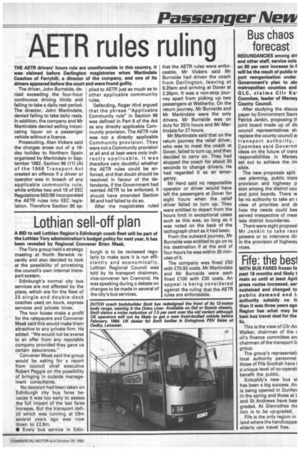THE AETR drivers' hours rule are unenforceable in this country,
Page 19

If you've noticed an error in this article please click here to report it so we can fix it.
it was claimed before Darlington magistrates when Martindale Coaches of Ferryhill, a director of the company, and one of its drivers appeared before the court and were found guilty.
The driver, John Burnside, denied exceeding the four-hour continuous driving limits and failing to take a daily rest period. The director, John Martindale, denied failing to take daily rests. In addition, the company and Mr Martindale denied selling intoxicating liquor on a passenger vehicle without a licence.
Prosecuting, Alan Vickers said the charges arose out of a 16day holiday to Northern Spain organised by Martindale in September 1982. Section 96 (11} (A) of the 1968 Transport Act created an offence if a driver or operator was in breach of any applicable community rule, while articles two and 19 of EEC Regulations 543/69 incorporated the AETR rules into EEC legislation. Therefore Section 96 ap plied to AETR just as much as to other applicable community rules.
Defending, Roger Hird argued that the phrase "Applicable Community rule" in Section 96 was defined in Part 6 of the Act as any directly applicable Community provision. The AETR rule was not a directly applicable Community provision. They were not a Community provision at all and at best were only indirectly applicable. It was therefore very doubtful whether the AETR rules could be enforced, and that doubt should be resolved in favour of the defendants. If the Government had wanted AETR to be enforced, it should have amended Section 96 and had failed to do so.
After the magistrates ruled
that the AETR rules were enforceable, Mr Vickers said Mr Burnside had driven the coach from Darlington, leaving at 8.20am and arriving at Dover at 2.30pm. It was a non-stop journey apart from picking up two passengers at Wetherby. On the return journey, Mr Burnside and Mr Martindale were the only drivers. Mr Burnside was on duty for 251/2 hours and Mr Martindale for 27 hours.
Mr Martindale said that on the return journey the relief driver, who was to meet the coach at Dover, failed to turn up, and they decided to carry on. They had stopped the coach for about 30 seconds to change drivers. He had regarded it as an emergency.
Mr Herd said no responsible operator or driver would have left the passengers at Dover for eight hours when the relief driver failed to turn up. They were entitled to depart from the hours limit in exceptional cases such as this was, so long as it was noted on the back of the tachograph chart as it had been.
From the outward journey, Mr Burnside was entitled to go on to his destination if at the end of four hours he was within 30 minutes of it.
The company was fined £50 with £70.92 costs. Mr Martindale and Mr Burnside were each fined £100 with £30 costs. An appeal is being considered against the ruling that the AETR rules are enforceable.




























































































